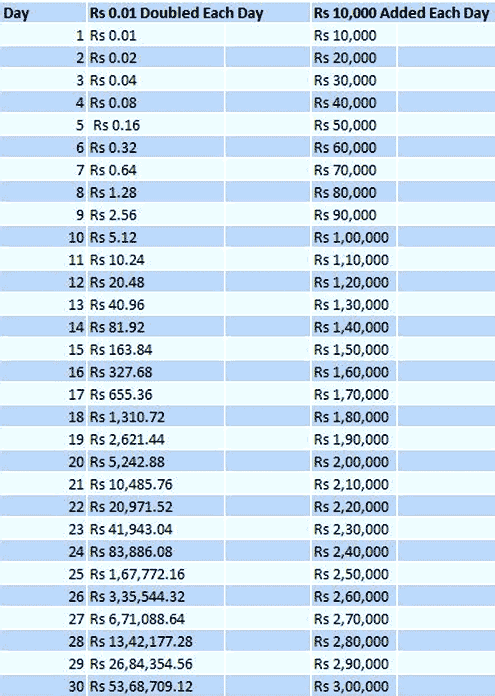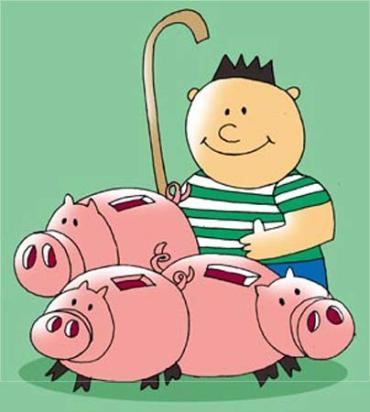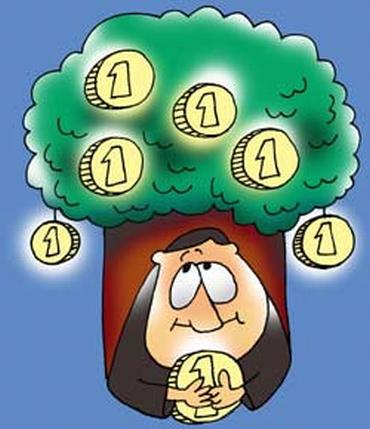 | « Back to article | Print this article |
How compound interest can make you RICH!
It's not just how much money you start with that counts, it's also how much time you allow that money to work for you.
Compound interest arises when interest is added to the principal of a sum, so that from that moment on, the accumulated interest that has been added also earns interest.
We see examples of compound interest in our everyday finances, both working for us, such as the interest in our savings accounts and investments, as well as against us, such as the interest accrued on credit card balances, mortgage payments, etc.
When it's working for us, the great part about compound interest is that it can help us to achieve our financial goals, such as becoming a millionaire, retiring comfortably, or being financially independent.
To see how it works, consider the scenario in teh NEXT slide
How compound interest can make you RICH!
Q: Would you rather have Rs 10,000 per day for 30 days or a paisa that doubled in value every day for 30 days?
A: If you chose the doubling paisa, you'd be a happy camper. At the end of 30 days, you would have over Rs 50 lakh versus the Rs 3 lakh had you chosen Rs 10,000 per day.
How compound interest can make you RICH!
Start early!
As you can see from the table in the previous slide, one of the key concepts about compounding is this: The earlier you start, the better off you'll be. Let's consider the case of two investors, A and B, who are both investing with the goal to become millionaires.
Say Investor A put Rs 2,000 per year into the market between the ages of 24 and 30; that he earned a 12 per cent after-tax return, and that he continued to earn 12 per cent per year until he retired at age 65.
Investor B also put in Rs 2,000 per year, earned the same return, but waited until he was 30 to start and continued to invest Rs 2,000 per year until he retired at age 65.
In the end, both would end up with about Rs 1 million.
How compound interest can make you RICH!
However, Investor A had to invest only Rs 12,000 (i.e., Rs 2,000 for six years), while Investor B had to invest Rs 72,000 (Rs 2,000 for 36 years) or six times the amount that Investor A invested, just for starting six years later.
Clearly, investing early can be at least as important as the actual amount invested over a lifetime. Therefore, to truly benefit from the magic of compounding, it's important to start investing early. We can't stress this fact enough!
After all, it's not just how much money you start with that counts, it's also how much time you allow that money to work for you.
How compound interest can make you RICH!
Be mindful of the rate
In addition to the amount you invest and an early start, the rate of return you earn from investing is also crucial. The higher the rate, the more money you'll have later. Let's assume that investors X and Y who, at age 24, began saving Rs 2,000 a year for six years.
But unlike Investor A in the previous example, who earned 12 per cent, Investor X earned only 8 per cent, while Investor Y did not make good investment decisions and earned only 4 per cent.
When they all retired at age 65, Investor A would have Rs 10,74,968, Investor X would have Rs 2,53,025, and Investor Y would have only Rs 56,620.
Even though Investor A earned only 8 percentage points more per year on his investments, or Rs 160 per year more on the initial Rs 2,000 investment, he would end up with about 20 times more money than Investor Y.
NEXT: A tip to calculate how your money can double
How compound interest can make you RICH!
Clearly, a few percentage points in investment returns or interest rates can mean a huge difference in your future wealth.
TIP: A simple way to know the time it takes for money to double is to use the rule of 72
For example, if you wanted to know how many years it would take for an investment earning 12 per cent to double, simply divide 72 by 12, and the answer would be approximately six years.
The reverse is also true. If you wanted to know what interest rate you would have to earn to double your money in five years, then divide 72 by five, and the answer is about 15 per cent.






